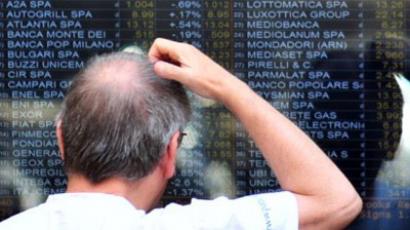‘Double-dip recession is here’
World markets plummeted on Thursday – their biggest drop in more than a month, sparking fears of a double-dip recession. This comes after a series of grim warnings over the global economy.
The US Federal Reserve has warned the American economy is facing significant risks, while in Europe the International Monetary Fund said the fiscal situation was entering a dangerous place.Margaret Bogenrief from crisis management firm ACM Partners says the recession is not something for the future, it is a reality of today.“Is double-dip recession looming? No! I, actually, think it’s here, and I, actually, think the fundamentals driving it have been here for a while – I would argue since 2008,” she told RT.Bogenrief says the present crisis has three major aspects:“I say there’s an economic one, a political one and a policy-driven one… Economically, the markets, investors, people playing within the financial space need to understand there’s no policy-driven economic magic bullet that’s going to save us. So, the faster the markets acknowledge that, the faster we can, kind of, put a clamp on this contraction of the world economy,” she said.“Now let’s take a look at the political sector. Voters across the borders, both in the United States and in Europe, need to understand [that] we are being rescued,” Bogenrief continued. “The sooner we acknowledge that and the sooner voters understand that no matter what politicians say, there’s no policy fix this, [the sooner the crisis] will slow down.”“And finally, let’s look at the policy side,” the economist went on to explain. “Let’s take a look at Greece particularly, and the queries in the European Union more broadly… If six months ago, when I would argue the financial writing was on the wall, these leaders took a look at this and said ‘OK, we’ve got to either fix this or get out’… think about how much money would have been saved… [and] pulled from a sinking ship that is inevitably going to sink, and be put back into buttressing German base, fixing French infrastructure.”“But again, the policy leaders were so forced to adhere with the political forces. That’s resulted in the crisis.”














